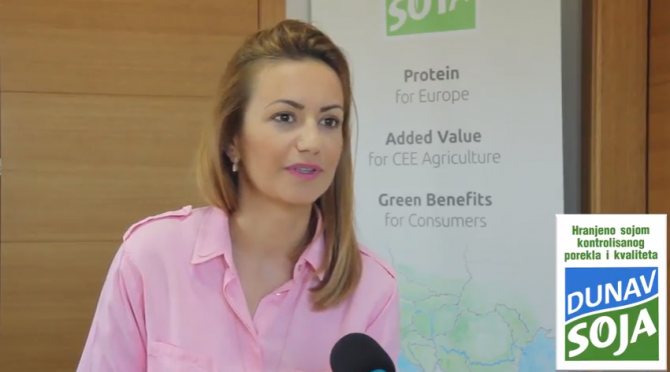This is just one of the questions to be answered by members of Danube Soya Regional Centre in Novi Sad. Founded in May 2014, this Centre still has a difficult task: to explain to the Serbian public that the most important thing that DANUBE SOYA quality label brings is freedom – the option to choose and buy GMO-free food produced domestically – if they want to. We talked to Marija Kalentić, General Manager of DANUBE SOYA.
Therefore, the mission of DANUBE SOYA Regional Centre in Novi Sad is to support soya bean growers and processors in Serbia to upgrade their production through GM-free Danube Soya certification and labelling, keeping in that way their value and identity. Only if eggs, milk and meat are labelled as Danube Soya GM-free and if our consumers know that this label stands foranimals fed with non-GM soya beans of domestic origin, then and only then does our soya stand a chance of surviving big challenges ahead!
Marija Kalentić, DANUBE SOYA General Manager says:
“Much was said about the Danube Soya during recent days, in recent months, since the Danube Soya has become more active here, we have established a center two years ago, in May 2014. And what is actually Danube Soya, we already have a lot of questions since we already have the first Danube Soya products on the market. What is important to know is that Danube Soya is a quality mark that appears on every end-product guaranteeing that the product is completely GMO-free. It is a product of controlled origin. These are mainly animal products, like eggs and milk, and for their production in Europe they need a lot of soya to feed the animals. They don’t have enough soya and they have to import it. Over 85% is GMO soya and it comes overseas. This type of soya is treated by glyphosate which was condemned by WHO as a cancer-producing chemical. The rain forests around the world are being cut in order to produce GMO-soya, and it was the initial spark that made a new agreement five years ago: The DANUBE SOYA Initiative from Vienna. It promotes cultivation and certification of GM-free soya in the Danube region. In 2013, agricultural ministers of Croatia, Austria, Serbia, Slovenia, Hungary, Switzerland, Romania, Bosnia-Herzegovina as well as Bavaria and Baden-Württemberg, signed the Danube Soya Declaration, confirming their intention to promote cultivation and marketing of high-quality, GM-free soya in their countries. Since then, Danube Soya has been slowly turning into an international movement. Today it has 240 members from 19 European countries, connected by the same vision: GMO-free Europe. Our members are coming from all part of the chain: from the soya cultivators to soya users. There are egg and milk and meat producers as well as big retail chains. Numerous other institutions are there: Danube Soya has a strong political support. Over 16 countries are signatories of the Declaration and it enables political support. It encourages the production of European non-GMO soya on large surfaces, and its use in the food industry, like feeding animals which produce human food. It helps communication and branding of such products on the final market.
Serbia has completely different situation, which is great. Serbia is one of the three largest soya bean producers in Europe and the only country that is self-sufficient when it comes to producing and processing soya for the domestic feed industry; in addition, it is completely closed to imports of genetically modified products. This means that all meat, eggs and milk in Serbia come from animals fed with domestic non-genetically modified (GM-FREE) soya bean.
Unfortunately so far we had no opportunity to mark our soya, and the Ministry of Agriculture for the first time allowed us last year to use such a label. DANUBE SOYA standard is in fact the first quality trademark in Serbia where the entire production chain – from farm and sylos to packing and fork –is controlled, thus guaranteeing to consumers that the product is GMO-free. It gives people the right to choose whether to consume the GMO or not, and, if they decide not to, then it allows them to opt for GM-free food and in addition to support domestic production at the same time, 50.000 of our soya producers are protected and they have their identity. Now without label they don’t know if the products are GMO or GMO-free, was it made from 85% of GMO soya from abroad. Therefore the quality mark is so important.“
